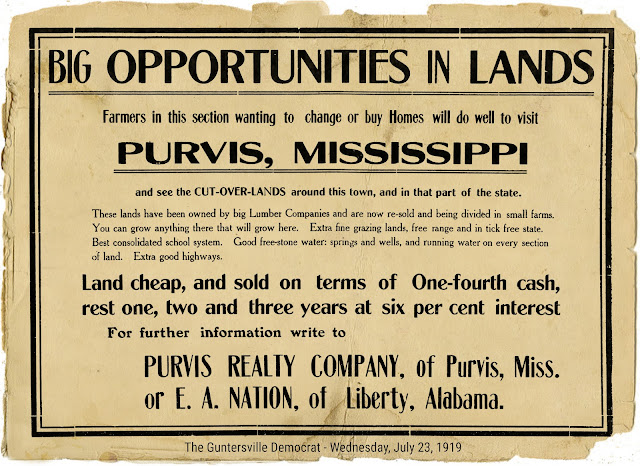A feud between Dr. Samuel E. Rees, editor and publisher of the Purvis Booster, and Wiley A. Blackburn, editor and publisher of the Progressive Star resulted in the death of Mr. Blackburn when Dr. Rees shot Blackburn four times. The shooting took place inside the Lamar County courthouse in Purvis, MS on October 19, 1915. The two men were at the courthouse to submit competing bids to print the ballots for the upcoming election. Blackburn was unarmed.
Dr. Rees was arrested and confined in the Lamar County jail. He was released under a $6,000 bond two days later.
On February 2, 1916, Dr. Rees was indicted by a grand jury of first degree murder and returned to jail. Bail of $15,000 was raised on behalf of Dr. Rees and he was released to await trial.
On February 14, 1916, a jury was finally seated and the trial began. Dr. Rees claimed that he shot Blackburn in self-defense. After a two day trial, the jury returned a verdict of murder in the first degree. Rees was sentenced to life in prison and again confined to jail.
A group of local area physicians petitioned for the release of Dr. Rees. They declared that Dr. Rees’s health “would not stand further confinement in jail.” On March 4, 1916, Rees was released on a $30,000 bond pending appeal of his murder conviction to the Mississippi Supreme Court.
On February 5, 1917, the Mississippi Supreme Court upheld the conviction and life sentence of Dr. Rees.
Soon petitions were circulated asking the recently elected Governor Theodore Bilbo to pardon Rees. Dr. Rees had been a prominent supporter of Bilbo’s campaign. On March 10, 1917, Governor Bilbo suspended the sentence of Dr. Rees “until July 15, at which time the state board of pardons will have met.” Dr. Rees was released from the state prison farm.
Dr. Rees returned to his home in Purvis. I found no record of it, but I assume the state board of pardons granted a full pardon to Dr. Rees. By June, 1917, Rees was once again appointed by the State Board of Health to be the health director for Lamar County. He is enumerated in Purvis in both the 1920 and 1930 census. Dr. Rees died on July 2, 1935.
More details about the murder, the trial, and the pardon can be found in the 16 newspaper clippings below.





































































































































































































































